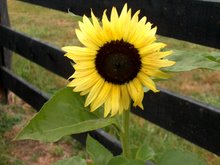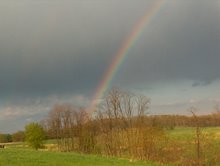
Our red raspberries were running a bit late this year due to the lack of rainfall in June and July. But with adequate rain in the last few weeks, they are now doing very well. Raspberries can't really be shipped very well and the ones that are imported or shipped have to be treated with fungicides to prevent mold. This info below was gleaned from the web site www.pickyourown.org. Besides compiling PYO farms, they provide lots of reference info, canning tips, etc. Thought I would pass on the info they provided about raspberries. We should have plenty at the market this weekend. However, if we pick them too quickly after a rain, they will mold quickly so they must be consumed or used right away, within a day or two. Its just not worth the potential health risks of getting involved with fungicide use just to get a few days of extra shelf life.
Raspberry Facts and Tips
- Raspberries come in many colors besides red: there are also black, purple and gold raspberries.
- Raspberries are a very healthy food; they are high Vitamin C and naturally have no fat, cholesterol or sodium. They are also a good source of iron and folate (which is used especially in treatment of low red blood cells or anemia). Raspberries contain a natural substance called ellagic acid, which is an anti-carcinogenic (cancer-preventing) compound. Raspberries have been shown to lower high blood cholesterol levels and slow release of carbohydrates into the blood stream of diabetics.
- Raspberries are high in fiber. Half to one pound of raspberry fruit per day can provide twenty to thirty grams of fiber which is adequate for an adult daily nutrition requirement.
- Select plump, firm, fully black berries. Unripe berries will not ripen once picked.
- Raspberries 1 pint = 2 cups = 500 ml and about 3/4 lb (about 1/3 kg) and is good for about 2 to 4 servings.
- 1 cup of raspberries is about 123 grams,
- The USDA says 1 cup is about 64 calories!
- Raspberries are a type of bramble, like blackberries and are also known as "Cane berries"
- Raspberries are different from blackberries in that the fruit has a hollow core that remains on the plant when you pick the raspberry.
- Raspberries are so expensive in the grocery store because, since they are so soft, they bruise easily, spoil quickly and do not ship well. It's much better to pick your own!
- 2 pints (4 cups) of raspberries are needed for a 9" pie
- 1 - 1¼ cups = 10 oz. package frozen berries
- 1 cup of raspberries is only 61 calories and high in dietary fiber
- Raspberries are high in potassium, vitamin A and calcium
- Raspberries contain about 50% of the recommended daily allowance of vitamin C.
- U-pick Raspberry farms typically sell berries by the pound or pint. A pint equals 3/4 pounds of fresh berries.
- Do the math and be careful not to over-purchase as Raspberries quickly mold when left at room temperature, and only last a couple of days in the refrigerator.
- You can easily freeze berries that you can not use right away - just wash, cut the hulls off and pop them into a ziplock bag, removing as much air as possible. Those vacuum food sealers REALLY do a good job of this! The berries will keep for many months frozen without air.




















No comments:
Post a Comment